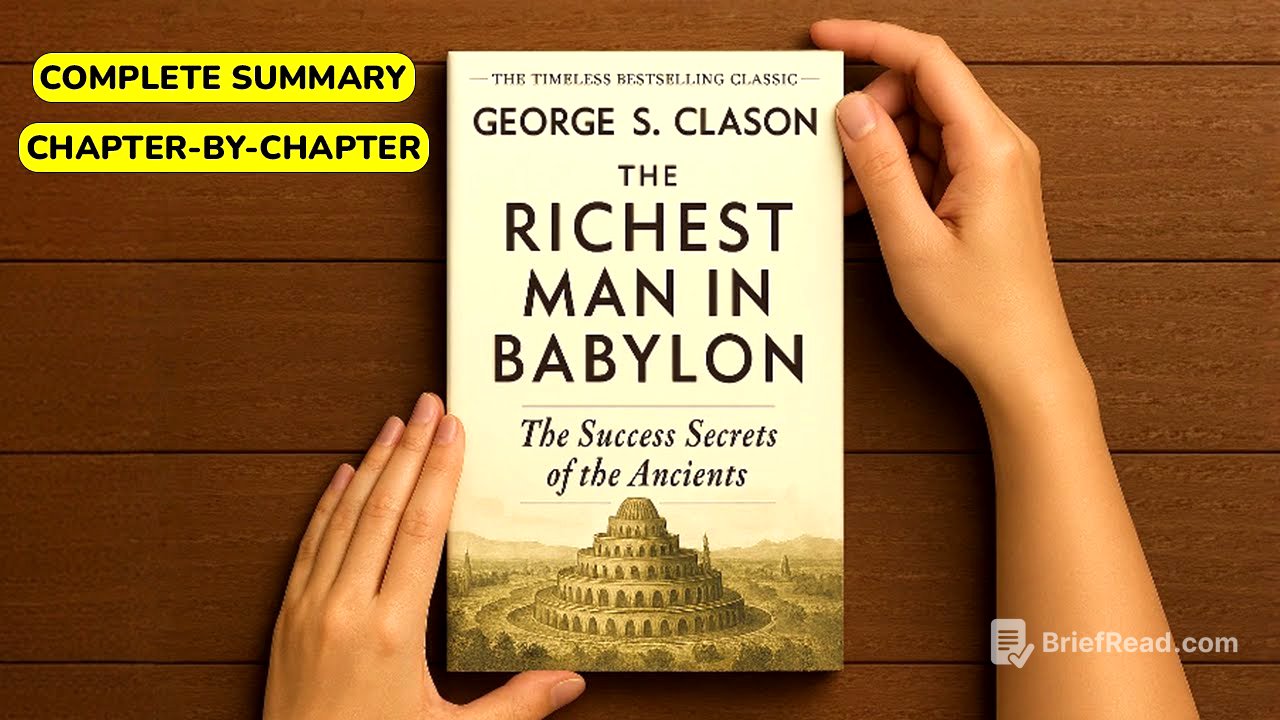TLDR;
This video summarizes George Samuel Clayson's "The Richest Man in Babylon," distilling its timeless financial wisdom into easily digestible lessons. The book, set in ancient Babylon, uses parables to illustrate principles of wealth accumulation, savings, and financial planning. The video explores key concepts such as paying yourself first, seeking wise counsel, making your gold multiply, protecting your wealth, and the importance of continuous learning and hard work.
- The book emphasizes the importance of financial discipline and planning.
- It highlights the value of seeking knowledge and advice from those who have achieved financial success.
- The stories illustrate that wealth is not solely dependent on luck but on consistent effort and smart financial decisions.
Prelude [0:00]
The video introduces "The Richest Man in Babylon" by George Samuel Clayson, emphasizing its timeless wisdom conveyed through simple, relatable stories. The book is set in ancient Babylon, a city that thrived despite lacking natural resources, thanks to the discipline, hard work, and smart thinking of its people. Clayson, a civil engineer who faced financial ruin during the Great Depression, drew upon these stories to rebuild his own fortune. The video aims to guide viewers through each chapter, offering financial insights applicable today.
A Historical Sketch of Babylon [3:13]
Babylon's rise as the financial center of the ancient world stemmed not from luck or location, but from the wisdom and industriousness of its people. They transformed a barren land into a prosperous one by creating extensive irrigation systems from the Euphrates River, turning arid soil into fertile farmland. The Babylonian kings prioritized farming, trade, engineering, and law, fostering a culture of creation over conquest. They also pioneered financial instruments like coins, loan contracts, and interest rates. The key takeaway is that wealth can be built in any condition through smart work and strategic planning.
Chapter 01: The Man Who Desired Gold [7:40]
Bansir, a skilled chariot builder in Babylon, feels stuck despite his hard work, prompting him to question why he can't retain any of his earnings. He discusses this frustration with his friend Kobe, a musician, and they realize they need financial wisdom, not just hard work, to improve their situation. They recall Arcad, who rose from humble beginnings to become the richest man in Babylon, and decide to seek his advice. The main lesson is that a purse empties quickly without a constant source to refill it, and acquiring financial knowledge is essential for building wealth.
Chapter 02: The Richest Man in Babylon [12:11]
Arcad shares his journey from being a poor scribe to becoming the richest man in Babylon. He recounts how he asked Algamish, a wealthy money lender, for the secret to wealth. Algamish revealed the first law: "A part of all you earn is yours to keep," advising Arcad to save at least one out of every ten coins earned. Arcad made mistakes, such as investing in fake jewels through a brick maker, but learned to seek advice from experts. He also learned to reinvest his profits instead of spending them on luxuries. Algamish eventually made Arcad a partner, emphasizing that success is preparation, not luck. The core message is to pay yourself first, seek wise counsel, and let your money work for you.
Chapter 03: Seven Cures for a Lean Purse [19:06]
King Sargon seeks Arcad's wisdom to help the people of Babylon prosper, leading to the revelation of seven cures for a lean purse. These include: 1) saving 10% of all earnings, 2) controlling expenditures through budgeting, 3) guarding treasures from loss by seeking wise counsel before investing, 4) making gold multiply through investments, 5) increasing earning ability by acquiring new skills, 6) owning your home as a profitable investment, and 7) ensuring a future income by saving for old age and unexpected events. These cures provide a comprehensive guide to building lasting wealth through disciplined financial habits.
Chapter 04: Meet the Goddess of Good Luck [24:57]
Arcad addresses the concept of luck, asserting that it favors workers and those who act decisively, not wishful thinkers or gamblers. He shares stories of missed opportunities due to hesitation and procrastination, emphasizing that good luck often disguises itself as a quick decision. The goddess of good luck rewards boldness and preparedness, not those who delay action. The key takeaway is that good luck can be invited by those who act promptly and decisively on opportunities.
Chapter 05: The Five Laws of Gold [30:51]
Calab shares a story about Arcad's son, Numsier, who was given gold and a tablet with five laws. Numsier initially squandered his wealth but learned from his mistakes by following the five laws of gold: 1) gold comes gladly to those who save at least one-tenth of their earnings, 2) gold works for the wise owner who finds it profitable employment, 3) gold clings to the cautious owner who seeks the counsel of wise men, 4) gold slips away from those who invest in things they do not understand, and 5) gold flees from those who try to force it to grow quickly or follow foolish advice. By adhering to these laws, Numsier rebuilt his fortune, demonstrating that wisdom is more valuable than gold itself.
Chapter 06: The Gold Lender of Babylon [37:47]
Rhoden, a spear maker, seeks advice from Mathan, a trusted money lender, after receiving 50 pieces of gold from the king. Mathan advises him to be cautious about lending, sharing stories of borrowers who failed due to lack of planning or experience. He identifies three types of borrowers: those with property, those with steady income, and those with only dreams, cautioning against lending to the last group. Mathan emphasizes the importance of testing potential borrowers and protecting one's wealth, highlighting the balance between safety and growth. The main lesson is to be wise and protect your earnings, and to avoid emotional decisions when lending.
Chapter 07: The Walls of Babylon [44:37]
The chapter shifts focus from gold to security, recounting the siege of Babylon by the Assyrians. The city's massive walls, built through careful planning and effort, protected its inhabitants. This serves as a metaphor for the need to build financial defenses against life's emergencies, such as job loss or illness. These defenses include an emergency fund, insurance, and a will. The key takeaway is that preparation and protection are essential for weathering unexpected storms, and building these "walls" should be a priority.
Chapter 08: The Camel Trader of Babylon [49:30]
The story of Dabasier, once a saddle maker, who fell into debt and became a slave, illustrates the path to reclaiming freedom and honor. Dabasier's turning point came when he resolved to repay his debts, escaping slavery and returning to Babylon. He worked diligently, eventually repaying every coin he owed and regaining his self-respect. The lesson is that determination can overcome even the most dire circumstances, and the only true failure is giving up on oneself.
Chapter 09: The Clay Tablets from Babylon [56:15]
Archaeologists discover clay tablets in Babylon containing Dabasier's financial plan for escaping debt. The plan involves three steps: saving 10% of all earnings, living on 70%, and using the remaining 20% to pay off debts. Professor Alfred Shrewsbury tests this plan in 1934 to overcome his own debt, and it proves successful. The main takeaway is that consistent, small actions can create powerful change, and this simple budgeting plan can help anyone regain control of their finances.
Chapter 10: The Luckiest Man in Babylon [1:01:34]
The story of Shahu Nada, who was sold into slavery for his brother's debts, demonstrates the power of work and persistence. Shahu's transformation from slave to respected merchant was not due to luck, but to his willingness to work hard and add value. He learned from a fellow slave, Megiddo, and was eventually freed and made a business partner by Arad Guler. The key message is that work is not a punishment but a superpower, and the ability to work diligently is the foundation of real success.
Epilogue [1:07:31]
The video concludes by reiterating the timeless lessons from "The Richest Man in Babylon," encouraging viewers to apply these principles to their own lives.









